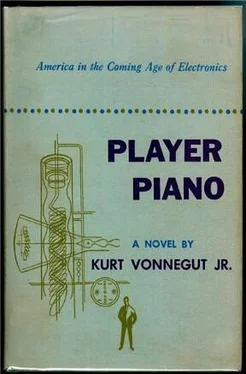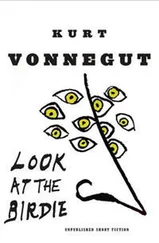"We're just plain folks," said Paul.
"What'll it be?" said the waitress.
"Scotch, double," said Martha.
"Same," said Barbara.
"Come here, damn it," said Finnerty, pulling Martha to his side again.
Barbara still kept her distance from Paul and looked at him distastefully. "What are you doing over here - having a good laugh at the dumb bunnies?"
"I like it over here," said Paul earnestly.
"You're making fun of me."
"Honest, I'm not at all. Did I say anything that sounded like I was?"
"You're thinking it," she said.
"That'll be four dollars for the ladies' drinks," said the waitress.
Paul paid again. He didn't know what to say next to Barbara. He didn't want to make a pass at her. He simply wanted her to be friendly and companionable, and to see that he wasn't a stuffed shirt at all. Far from it.
"They don't castrate you when they give you an engineering degree," Finnerty was saying to Martha.
"They might as well," said Martha. "Some of the kids that come over from across the river -you'd think they were."
"After our time," said Finnerty. "I meant they didn't use to."
To build up more of an atmosphere of intimacy, rapport, Paul casually picked up one of the shot-glasses before Barbara and sipped at it. It then dawned on him that the shots of expensive Scotch, which had been arriving as though by bucket brigade, were no more than brown water. "Smooth," he said.
"So what am I supposed to do, have a nervous breakdown?" said Barbara. "Let me out."
"No, please, that's all right. Just talk to me is all. I understand."
"What'll it be?" said the waitress.
"Scotch, double, with water," said Paul.
"Trying to make me feel bad?"
"I want you to feel good. If you need money, I want to help." He meant it with all his heart.
"Suit yourself, plunger," said Barbara. She looked restlessly about the room.
Paul's eyelids grew heavier and heavier and heavier as he tried to think of the phrase that would break the ice with Barbara. He folded his arms on the table top and, for just an instant's rest, he laid his head on them.
When he opened his eyes again, Finnerty was shaking him, and Barbara and Martha had gone. Finnerty helped him out onto the sidewalk for air.
The out-of-doors was a nightmare of light and noise, and Paul could see that some sort of torchlight parade was under way. He burst into a cheer as he recognized Luke Lubbock, who was being borne by in a sedan chair.
When Finnerty had established him back in the booth, a speech, the nugget of the whole evening's nebulous impressions, composed itself in Paul's mind, took on form and polish inspirationally, with no conscious effort on his part. He had only to deliver it to make himself the new Messiah and Ilium the new Eden. The first line was at his lips, tearing at them to be set free.
Paul struggled to stand on the bench, and from there he managed to step to the table. He held his hands over his head for attention.
"Friends, my friends!" he cried. "We must meet in the middle of the bridge!" The frail table suddenly lurched beneath him. He heard the splitting of wood, cheers, and again - darkness.
The next voice was the bartender's. "Come on - closing time. Gotta lock up," said the bartender gently.
Paul sat up and groaned. His mouth was dry, and his head ached. The table was gone from the booth, and there were only cracked plaster and boltheads to show where it had once been moored to the wall.
The saloon seemed deserted, but the air was filled with a painful clangor. Paul peered out of the booth and saw a man mopping the floor. Finnerty sat at the player piano, savagely improvising on the brassy, dissonant antique.
Paul shuffled over to the piano and laid his hand on Finnerty's shoulder. "Let's go home."
Finnerty continued to lash at the keys. "Staying!" he shouted above the music. "Go home!"
"Where you going to stay?"
Then Paul saw Lasher, who sat unobtrusively in the shadows, leaning against the wall in a chair. Lasher tapped his thick chest. "With me," he said with his lips.
Finnerty shook off Paul's hand and wouldn't answer.
"O.K.," said Paul fuzzily. "So long."
He stumbled into the street and found his car. He paused for a moment to listen to Finnerty's hellish music echoing from the façades of the sleeping town. The bartender stood respectfully at a distance from the frenzied pianist, afraid to interrupt.
AFTER the night with Finnerty and Lasher, and with the good little people, Alfy, Luke Lubbock, the bartender, and Martha and Barbara, Doctor Paul Proteus slept until late in the afternoon. When he awoke, Anita was out of the house, and with a dry mouth, burning eyes, and a stomach that felt as though it were stuffed with cat fur, he went to his responsible post in the Ilium Works.
The eyes of Doctor Katharine Finch, his secretary, were bloodshot for another reason, a reason so all-consuming that she took little note of the condition of Paul.
"Doctor Kroner called," she said mechanically.
"Oh? He wants me to call back?"
"Doctor Shepherd took the message."
"He did, eh? Anything else?"
"The police?"
"Police? What did they want?"
"Doctor Shepherd took the message."
"All right." Everything seemed hot and bright and soporific. He sat on the edge of her desk, and rested. "Get Dog-Eat-Dog on the phone."
"That won't be necessary. He's in your office now."
Wondering bleakly what grievance or slight or infraction of rules Shepherd wanted to see him about, Paul pushed open his office door gingerly.
Shepherd sat at Paul's desk, absorbed in signing a stack of reports. He didn't look up. Briskly, his eyes still on the papers, he flicked on the intercom set. "Miss Finch -"
"Yessir."
"On this monthly security report: did Doctor Proteus tell you how he planned to handle Finnerty's admission without escort yesterday?"
"I planned to keep my big mouth shut about it," said Paul.
Shepherd looked up with seeming pleasure and surprise. "Well, speak of the Devil." He made no move to get out of Paul's chair. "Say," he said with hearty camaraderie, "I guess you were really hung over, eh, boy? Should have taken the whole day off. I know my way around well enough to fill in for you."
"Thanks."
"No trouble. There really isn't a heck of a lot to the job."
"I expected Katharine to watch over things for me, and call for help if she needed it."
"You know what Kroner would think of that. It doesn't take a whole lot more trouble to do things right, Paul."
"Do you mind telling me what Kroner wanted?"
"Oh, yes - he wants to see you tonight instead of Thursday. He's got to be in Washington tomorrow night, and for the rest of the week."
"Wonderful. And what's the good news from the police?"
Shepherd laughed richly. "Some foul-up. They were all excited about a pistol they found down by the river. They claimed the serial numbers were for a gun checked out to you. I told them to check again - that no man who's bright enough to be manager of the Ilium Works is dumb enough to leave a pistol around loose."
"That's a nice tribute, Shep. Mind if I use my phone?"
Shepherd pushed the phone across the desk and went back to signing: "Lawson Shepherd, in absence of P. Proteus."
"Did you tell him I had a hangover?"
"Hell no, Paul. I covered up for you all right."
"What did you say was wrong?"
"Nerves."
"Great!" Katharine was getting Kroner's office on the line for Paul.
"Doctor Proteus in Ilium would like to speak to Doctor Kroner. He's returning Doctor Kroner's call," said Katharine.
It wasn't a day for judging proportions. Paul had been able to take the disturbances of Kroner, Shepherd, and the police with something bordering on apathy. Now, however, he found himself enraged by the ceremony of official telephone etiquette - time-consuming pomp and circumstance lovingly preserved by the rank-happy champions of efficiency.
Читать дальше








![Курт Воннегут - Вампитеры, фома и гранфаллоны [litres]](/books/397997/kurt-vonnegut-vampitery-foma-i-granfallony-litre-thumb.webp)